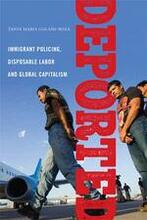Publications
2016
The implementation of restrictive immigration laws in 1997 in the United States has led to the deportation of hundreds of thousands of legal permanent residents—denizens who had made the United States their home. Mass deportations of denizens have given renewed importance to territorial belonging and legal citizenship for theories of citizenship, a relatively neglected area of scholarship in this field. This article draws from interviews with 30 deported Jamaicans who were once legal permanent residents of the United States to argue that denizens often feel “like citizens” based on their family and community ties to the United States, yet that their allegiance and sense of belonging is primarily to their family and community—not to the state. In this sense, there is a disconnect between the law—which privileges legal citizenship—and the daily lives of denizens—in which they can experience a profound sense of belonging in their communities.
This article contests the contention that sociology lacks a sound theoretical approach to the study of race and racism, instead arguing that a comprehensive and critical sociological theory of race and racism exists. This article outlines this theory of race and racism, drawing from the work of key scholars in and around the field. This consideration of the state of race theory in sociology leads to four contentions regarding what a critical and comprehensive theory of race and racism should do: (1) bring race and racism together into the same analytical framework; (2) articulate the connections between racist ideologies and racist structures; (3) lead us towards the elimination of racial oppression; and (4) include an intersectional analysis.
2015
Race and Racisms, A Critical Approach, Brief Edition, is a topical critical text that engages students in significant questions related to racial dynamics in the United States and around the world. Approximately thirty percent shorter than Golash-Boza’s highly acclaimed comprehensive text, the Brief Edition features a streamlined narrative and is enhanced by its own unique features. It is ideal for instructors who want the flexibility to assign additional readings.Race and Racisms: A Critical Approach engages students in significant questions related to racial dynamics in the U.S. and around the world. Written in accessible, straightforward language, the book discusses and critically analyzes cutting-edge scholarship in the field. Organized into topics and concepts rather than discrete racial groups, the text addresses:* How and when the idea of race was created and developed* How structural racism has worked historically to reproduce inequality* How we have a society rampant with racial inequality, even though most people do not consider themselves to be racist* How race, class, and gender work together to create inequality and identities* How immigration policy in the United States has been racialized* How racial justice could be imagined and realizedCentrally focused on racial dynamics, Race and Racisms, Brief Edition also incorporates an intersectional perspective, discussing the intersections of racism, patriarchy, and capitalism.
The United States currently is deporting more people than ever before: 4 million people have been deported since 1997—twice as many as all people deported prior to 1996. There is a disturbing pattern in the population deported: 97% of deportees are sent to Latin America or the Caribbean, and 88% are men, many of whom were originally detained through the U.S. criminal justice system. Weaving together hard-hitting critique and moving first-person testimonials, Deported tells the intimate stories of people caught in an immigration law enforcement dragnet that serves the aims of global capitalism. Tanya Golash-Boza uses the stories of 147 of these deportees to explore the racialized and gendered dimensions of mass deportation in the United States, showing how this crisis is embedded in economic restructuring, neoliberal reforms, and the disproportionate criminalization of black and Latino men. In the United States, outsourcing creates service sector jobs and more of a need for the unskilled jobs that attract immigrants looking for new opportunities, but it also leads to deindustrialization, decline in urban communities, and, consequently, heavy policing. Many immigrants are exposed to the same racial profiling and policing as native-born blacks and Latinos. Unlike the native born, though, when immigrants enter the criminal justice system, deportation is often their only way out. Ultimately, Golash-Boza argues that deportation has become a state strategy of social control, both in the United States and in the many countries that receive deportees.
The number of people being removed from the USA on an annual basis is far higher than ever before. The increases in removals since the passage of the 1996 laws have had a disproportionate impact on Mexican and Central American male immigrants. Moreover, the changes made to the laws in 1996 were draconian insofar as they removed judicial discretion in certain removal cases, and the laws were applied retroactively. The raced and gendered disparities in immigration law enforcement are one more instance of institutionalized racism in the USA insofar as these laws primarily harm black and Latino families.
2014
Once forcibly returned to their countries of citizenship, how and why do deportees engage in transnational relationships? Through analyses of 37 interviews with Jamaican deportees, I approach the question of why deportees engage in transnational practices and reveal that deportees use transnational ties as coping strategies to deal with financial and emotional hardship. This reliance on transnational ties, however, has two consequences: (1) male deportees who rely on transnational strategies to survive face a gendered stigma because they must relinquish the provider role and become dependants; and (2) the transnational coping strategies serve as a reminder of the shame, isolation and alienation that deportees experience because of their deportation. This consideration of the consequences of transnational relationships sheds light on why some migrants are transnational and others are not.




